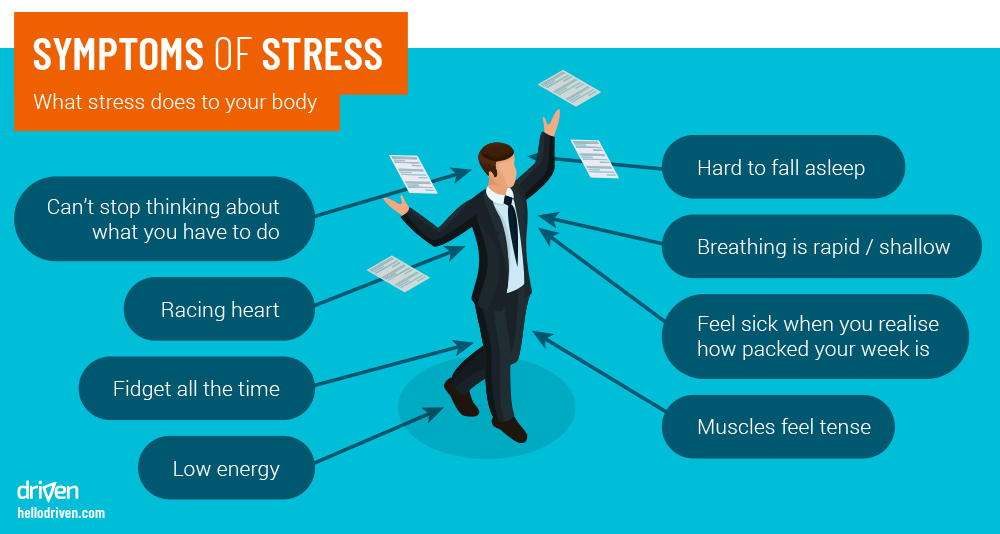Symptoms Of Stress

Stress is a ubiquitous and multifaceted phenomenon that can manifest in various ways, affecting individuals from all walks of life. It is a natural response to a perceived threat or pressure, triggering the release of hormones like cortisol and adrenaline, which prepare the body to either confront the challenge or flee from it. However, chronic or excessive stress can have debilitating effects on both physical and mental health. Recognizing the symptoms of stress is crucial for mitigating its adverse consequences and promoting overall well-being.
Physical Symptoms
The physical manifestations of stress are numerous and can vary significantly from one individual to another. Some common physical symptoms include:
- Headaches and Migraines: Tension headaches are a frequent complaint, often described as a band or a vice-like sensation around the forehead, back of the neck, or both.
- Fatigue and Insomnia: Despite feeling exhausted, many individuals under stress experience difficulty sleeping or insomnia, creating a vicious cycle of tiredness.
- Gastrointestinal Issues: Stress can lead to stomach upset, including irritable bowel syndrome (IBS), constipation, diarrhea, or stomach pain.
- Muscle Tension: This can result in back, neck, or shoulder pain due to tightened muscles.
- Weight Changes: Some people may experience weight gain or loss due to stress, depending on whether they tend to overeat or undereat when anxious.
Emotional and Psychological Symptoms
The emotional and psychological toll of stress should not be underestimated. Symptoms in this realm can include:
- Anxiety and Depression: Chronic stress is a significant risk factor for the development of anxiety disorders and depression.
- Mood Swings: Irritability, restlessness, and mood swings are common, affecting relationships and overall quality of life.
- Cognitive Impairment: Difficulty concentrating, memory problems, and decreased productivity can all be symptoms of stress.
- Loss of Interest: Activities once enjoyed may no longer seem appealing, leading to feelings of emptiness or hopelessness.
Behavioral Symptoms
Changes in behavior can also signal that an individual is struggling with stress. These may include:
- Substance Abuse: Turning to alcohol, tobacco, or illicit drugs as a coping mechanism.
- Social Withdrawal: Avoiding social interactions or becoming withdrawn.
- Nervous Habits: Developing habits like nail biting, pacing, or other repetitive behaviors.
- Changes in Appetite: Either overeating or undereating in response to stress.
Managing Stress
Given the wide range of symptoms and the potential for serious health consequences, managing stress is essential. Strategies for stress management can be broadly categorized into lifestyle changes, stress reduction techniques, and seeking professional help when necessary.
Lifestyle Changes
- Regular Exercise: Physical activity is a natural stress reliever, improving mood and reducing tension.
- Healthy Diet: Eating a balanced diet that includes plenty of fruits, vegetables, whole grains, and lean proteins can help maintain energy levels and support overall health.
- Adequate Sleep: Prioritizing sleep and establishing a consistent sleep schedule is crucial for managing stress.
Stress Reduction Techniques
- Meditation and Mindfulness: Practices like meditation and mindfulness can help reduce stress by promoting relaxation and improving emotional regulation.
- Deep Breathing Exercises: Simple yet effective, deep breathing can calm the nervous system and reduce feelings of overwhelm.
- Time Management: Learning to prioritize tasks, set realistic goals, and take regular breaks can help manage stress related to work or responsibilities.
Seeking Professional Help
For some, the symptoms of stress can become overwhelming, leading to mental health issues like depression or anxiety disorders. In such cases, seeking help from a mental health professional is a sensible and important step. Therapy can provide individuals with the tools and support needed to manage stress effectively and improve their quality of life.
What are the most common symptoms of stress?
+The most common symptoms of stress include physical symptoms like headaches, fatigue, and gastrointestinal issues, as well as emotional and psychological symptoms such as anxiety, depression, and mood swings. Behavioral changes like substance abuse, social withdrawal, and changes in appetite can also be indicative of stress.
How can stress affect physical health?
+Chronic stress can have significant effects on physical health, including an increased risk of cardiovascular disease, obesity, diabetes, and a weakened immune system. It can also exacerbate existing conditions like arthritis, asthma, and irritable bowel syndrome.
What are some effective ways to manage stress?
+Effective stress management involves a combination of lifestyle changes, stress reduction techniques, and sometimes seeking professional help. Lifestyle changes include regular exercise, a healthy diet, and adequate sleep. Stress reduction techniques such as meditation, mindfulness, and deep breathing exercises can also be very beneficial. Lastly, recognizing when to seek help from a mental health professional is important for managing severe stress and related mental health issues.
In conclusion, stress is a complex condition with a wide array of symptoms that can impact every aspect of an individual’s life. Understanding these symptoms and adopting effective strategies for stress management are crucial steps towards maintaining physical and mental well-being. By acknowledging the signs of stress and taking proactive measures to mitigate its effects, individuals can work towards leading healthier, more balanced lives.



